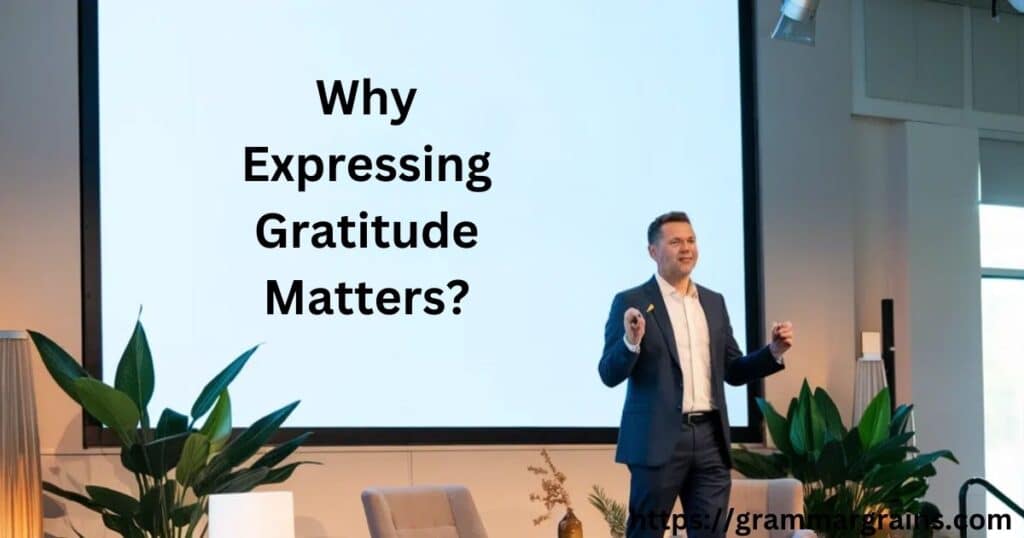Finding the right words to show gratitude is essential in professional interactions. While “Thank you for your interest” is a widely accepted phrase, it can often feel repetitive and impersonal.
This article explores ten engaging alternatives to express appreciation, helping you create meaningful and professional connections.
Each alternative includes context on when to use it and how to craft a personalized, impactful message. By the end, you’ll have the tools to keep your communication fresh, genuine, and effective.
In the United States, gratitude is deeply woven into the culture.
People value words like “thank you” as markers of professionalism, politeness, and empathy.
Gratitude has always been more than just a polite gesture; it is a social currency that strengthens connections and fosters goodwill. The act of saying “thank you” is not merely about fulfilling a social obligation. Instead, it reflects a deeper appreciation for someone’s actions, efforts, or thoughtfulness. By thanking others, you show that you value their time, ideas, or gestures. This acknowledgment fosters trust and opens pathways for enhanced engagement.
Consider this example:
Emily, a project manager at a growing startup, made it a habit to thank her team during meetings.
She didn’t stop at vague platitudes like, “Good job, everyone.”
Instead, she personalized her gratitude by addressing each member’s contribution. “
Jessica, your research on user trends really improved our presentation,”
she’d say.
This approach not only boosted morale but also encouraged her team to consistently give their best.
Scientific studies also underline the benefits of gratitude.
Research shows that people who regularly express thanks experience better mental health, reduced stress, and stronger relationships.
Gratitude fosters positivity, and this positivity ripples outward, influencing those around you.
Whether you’re addressing Mr. Lee about a project or thanking Sarah for helping organize a webinar, gratitude helps build rapport and create meaningful interactions.
Why Expressing Gratitude Matters

The importance of gratitude extends far beyond polite words.
It is a tool for building connections, inspiring loyalty, and fostering collaboration. When you thank someone, you acknowledge their effort and recognize their value.
This recognition matters, especially in a professional setting where mutual respect drives success.
Let’s take the example of Tom, a sales manager who always included “thank you” in his client communications.
He didn’t limit himself to saying,
“Thanks for your order.”
Instead, he made his gratitude specific:
“Thank you for trusting us to deliver your project on time. Your confidence means a lot to us.”
Over time, his personalized messages built strong client relationships, resulting in increased referrals and repeat business.
Gratitude also strengthens personal relationships.
Imagine Laura, who regularly thanked her friends for their support.
When her friend Daniel helped her move into a new apartment, she didn’t just say,
“Thanks for the help.”
Instead, she expressed her appreciation with sincerity:
“Thank you for spending your Saturday with me. I couldn’t have done it without you.”
This specificity deepened their bond and reinforced their friendship.
In a professional context, gratitude encourages collaboration.
When leaders like Ms. Turner or Mr. Adams consistently thank their teams for their efforts, it fosters a culture of respect and teamwork.
Employees feel valued, which boosts morale and productivity.
In fact, companies that cultivate a culture of gratitude often report higher employee retention rates and better performance metrics.
Saying “Thank You for Your Interest”

Is It Professional to Say “Thank You for Your Interest”?
Yes, it is professional to say,
“Thank you for your interest.”
This phrase demonstrates respect and acknowledgment.
It’s particularly useful in contexts like responding to inquiries about a service, product, or community outreach program.
For instance, when Mr. Brown, a nonprofit director, responded to prospective donors with,
“Thank you for your interest in supporting our mission,”
it encouraged continued dialogue and engagement.
However, using this phrase effectively requires thoughtfulness.
A generic response may seem insincere. Instead, tailor your message to reflect the recipient’s specific interest.
For example, if someone inquires about future plans for a workshop, you could say,
“Thank you for your interest in our upcoming events.
We’re excited to share more details soon.”
This approach feels personalized and meaningful.
Why Should You Use Alternative Phrases?
Using alternative ways to express gratitude keeps your communication fresh and engaging.
Repeating the same phrase can make your messages feel robotic.
For example, Angela, a customer service representative, noticed that clients responded more positively when she varied her language.
Instead of repeatedly saying,
“Thank you for your interest,”
she alternated with phrases like,
“We’re thrilled by your curiosity”
or
“We appreciate your engagement.”
This variation kept her emails engaging and professional.
Variety also helps maintain a positive tone in professional communication
It shows that you’ve put thought into your response, which builds trust.
Whether you’re addressing a query about a proposal or acknowledging someone’s participation in a focus group, alternative expressions of gratitude add depth to your message.
Alternatives to Say “Thank You for Your Interest”
| Expression | Example Usage |
|---|---|
| We appreciate your interest | “Thank you for inquiring about our upcoming product launch.” |
| Thanks for inquiring | “We’re glad you’re interested in our mission and values.” |
| Your inquiry is greatly appreciated | “Your curiosity about our latest workshop means a lot.” |
| We’re grateful for your interest | “Your engagement in our focus group is truly valued.” |
These alternatives show appreciation while keeping the conversation engaging.
For instance, when Karen, a recruiter, replied to job applicants with
“We value your interest in joining our team,”
it left a positive impression and encouraged applicants to remain enthusiastic about the opportunity.
Saying “Thank You for Reaching Out”

Acknowledging someone’s effort to contact you is vital in maintaining positive communication.
Expressing gratitude for their initiative not only fosters goodwill but also encourages further interaction.
For example, when James thanked Ms. Clark for her feedback on a proposal, it led to constructive discussions and ultimately a better outcome for their project.
A personalized response can make all the difference. Instead of using a standard phrase like, “Thank you for contacting me,” consider saying, “I appreciate your thoughts on this matter.”
This approach feels more sincere and encourages ongoing dialogue.
Short email examples like these are highly effective in fostering engagement.
Saying “Thank You in Advance”

Meaning and Context of “Thank You in Advance”
The phrase “Thank you in advance” is widely used in professional communication, especially in emails.
It conveys gratitude for assistance or support that the sender anticipates receiving.
For instance, when Jonathan, a project coordinator, requested feedback on a proposal, he concluded his email with,
“Thank you in advance for reviewing this document.”
This phrase set a positive tone and encouraged prompt responses.
However, this phrase works best when the request is reasonable and not overly demanding.
In cases where “Thank you in advance”
might feel presumptuous, alternative expressions like
“I appreciate your time”
or
“Thanks for considering my request”
are more suitable.
These alternatives ensure that your gratitude feels sincere and avoids assumptions about the recipient’s actions.
Examples of Using “Thank You in Advance”
Using this phrase effectively requires clarity and context. Consider these examples:
- “Thank you in advance for attending our upcoming webinar on environmental sustainability.”
- “I appreciate your guidance on the new community outreach program and value your expertise.”
These examples highlight gratitude while maintaining a professional tone. By framing the request positively, you make the recipient feel valued and respected.
Conclusion
Gratitude is a small act that carries significant weight in both personal and professional interactions. Saying “thank you” fosters trust, builds relationships, and promotes goodwill. It’s not just about being polite; it’s about showing genuine appreciation for others’ efforts and contributions. Whether it’s a simple acknowledgment in an email or a heartfelt thank-you during a meeting, these expressions of gratitude leave a lasting impression.
By incorporating alternatives to traditional phrases like “Thank you for your interest” or “Thank you for reaching out,” you can keep your communication fresh and meaningful. Remember, gratitude is a universal language that resonates with everyone. Use it thoughtfully to strengthen connections and create positive, lasting impacts in your personal and professional life.
FAQs
Q: Is it always appropriate to say “Thank you in advance”?
A: Use it when the request is reasonable and doesn’t imply entitlement.
Q: What’s a good alternative for “Thank you for your interest”?
A: Try “We appreciate your curiosity” or “Your engagement means a lot.”
Q: Can gratitude improve workplace relationships?
A: Yes, it fosters respect, teamwork, and collaboration.
Q: How can I make my “thank you” feel more genuine?
A: Personalize it by mentioning specific actions or contributions.

Taila Lucy, an expert content writer at Grammar Grains, brings 4 years of experience crafting engaging pieces on grammar. Her work delves into synonyms, antonyms, slang, puns, and poetry, helping readers master English with creativity and flair.







